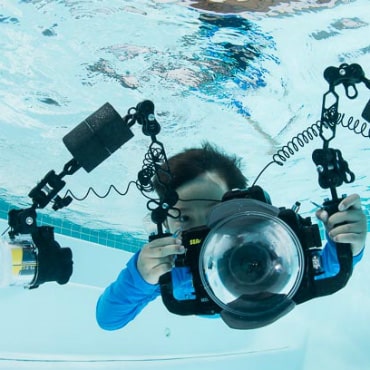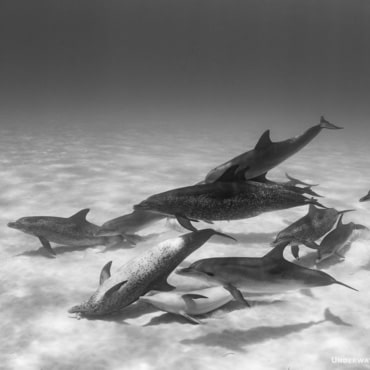Scubalamp D-Pro Strobe Review
Posted by Nirupam Nigam on July 21st, 2023

Although underwater strobes are essential tools for bringing back color and detail into your underwater photos, it's not every day that a new one enters the market. The Scubalamp D-Pro is the newest underwater strobe found exclusively at Bluewater Photo capable of a 160 Ws output (GN of 30), a 150 degree beam angle, and 500 full power flashes per charge! When we first heard the rumors of what this strobe could do for a price point of $758, we almost didn't believe it. With strobe prices increasing across the board, the D-Pro's spec sheet just didn't seem possible. But after we put the Scubalamp D-Pro strobe to the test in warm Caribbean waters, we can confirm that sometimes a specs sheet that seems too good to be true, is just true.
Scubalamp D-Pro Strobe Key Specifications
Let's start by taking a look at everything the Scubalamp D-Pro has to offer for underwater photographers:
- Anodized aluminum construction with a sealed battery compartment
- Guide number @ ISO 100: 30
- 160 Ws output
- Circular flash tube with a 150 degree beam angle
- 0.1 - 1.1 second recycle time
- At low power, 10 flashes per second sync
- 9 step manual power controls - no TTL or S-TTL
- SUPE lithium ion battery pack
- Battery Life: 500 flashes at full power per charger
- Color Temperature: 4800 K
- 500 lumen center focus/targeting light
- Depth rating: 100 meters (330 ft)
- Dimensions: 170mm x 90mm
- Weight (land): 1080g without battery
- Weight (underwater): 120 g
- Protective neoprene covers included
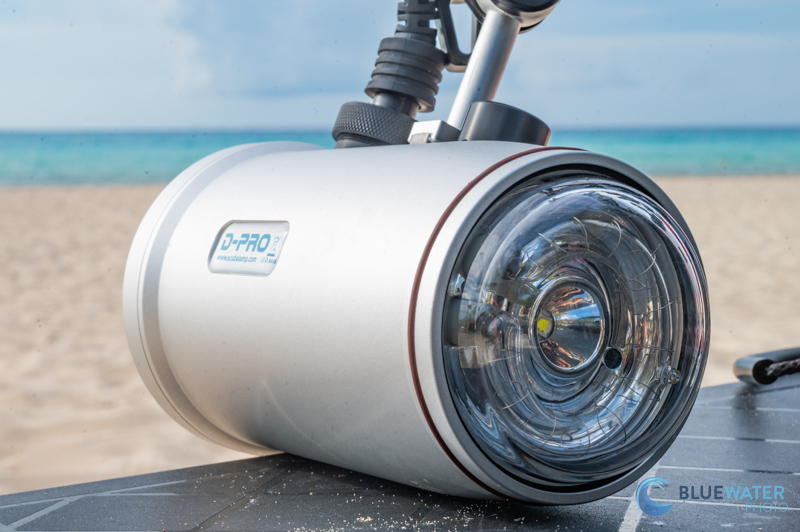
The Scubalamp D-Pro Strobe After Two Weeks of Diving in Cozumel
Size, Build, and Ergonomics
Scubalamp's first strobe came out of the gates sleek and sexy. With a smooth, bright, and sturdy aluminum finish, the D-Pros are reminiscent of a gadget from a 1960s Si-Fi film. The strobes also come with a protective neoprene cover for those who are concerned about the silver shine attracting sharks. The finish on the strobe does get a bit scratched after a lot of use and traveling, but overall it stayed in good shape, and it clearly made to last well past the two year warranty.
The covers can also help add buoyancy underwater. This is necessary because the biggest downside of these strobes is that they are large and heavy - like other Lithium Ion and NiMH type strobes. These battery packs produce quicker recycle times and longer battery life than AA battery strobes. Underwater the strobes lighten up quite a bit and only weigh 120 g without the neoprene covers.

Colorful reef fish photographed with the Scubalamp D-Pro strobe and Nikon Z8 camera. 1/160, f/13, ISO 200
The light head on the D-Pro strobes are designed with a circular flash tube which produces nice, even light with minimal hotspots. Many underwater photographers prefer the quality of light from circular flash tubes to rectangular flash prisms. Around the flash tube cover, there is a retaining o-ring designed for attaching diffusers to the strobe. Although it does a great job of holding the diffusers in place, we found that the o-rings would pop off fairly easily when removing the diffusers. So be careful not to loose one!
When it come to mounting options, the D-Pro is equipped with a fairly universal 1-inch ball mount with a long stem. The stem of the ball mount helps keep it extended from the arms of the housing, making it easy to maneuver the strobe.
The D-Pro strobe can be triggered via both Sea & Sea style fiber optic cables and 5-pin sync cords - the same style found on Inon and Sea & Sea strobes.
Finally, let's talk ergonomics. The back panel controls on the D-Pro are extremely easy to use and adjust. An LED screen indicates power levels and battery life. There are two dials. One allows you to turn the strobe to manual mode (both single flash and preflash) and the other dial adjusts the power levels on the strobe (from 1-9). Both dials extend quite far from the back panel making it extremely easy to adjust your settings even with thick gloves.
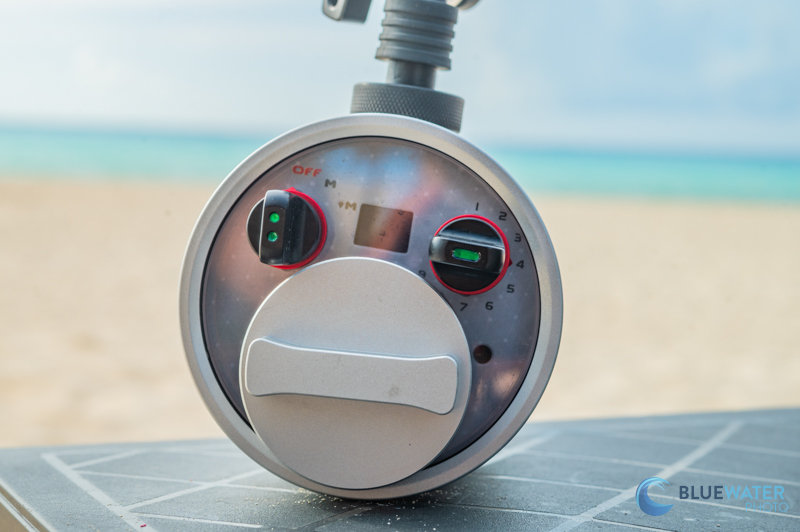
The back panel and controls of the Scubalamp D-Pro Strobe
Beam Quality
In Cozumel, we were very excited to light up the beautiful sponges on the reef with a strobe capable of outputting an ultra-wide 150 degree beam - without diffusers! Although Scubalamp offers a wide angle and macro diffuser for the D-Pro, the beam is so wide that it has no problem covering almost any field of view. We did use the diffusers at times to soften up the light so that our images had softer contrast and smaller pieces of backscatter (though slightly more of it).
The light itself shines very evenly on subjects with a warm color temperature of 4800K. While we felt the color temperature might be slightly colder than what was listed on paper, a warmer color temperature allows you to produce very nice background blues in your images. This is because a white balance correction for the area of the image that is lit by the strobe will result in a colder, bluer background to compensate for the warm foreground. The colors in our images do speak for themselves.
The output of the 160 Ws strobe is slightly more diffuse as a result of the 150 degree beam angle. This means the guide number is less than other 160 Ws strobes at 30. While strobes with narrower beam angles have more power, they need diffusers that result in a similar beam angle and power level. We had no problem lighting up wide angle scenes, in clear tropical, blue water. These scenes that typically the highest levels of power from a strobe to match the bright ambient light while diving.
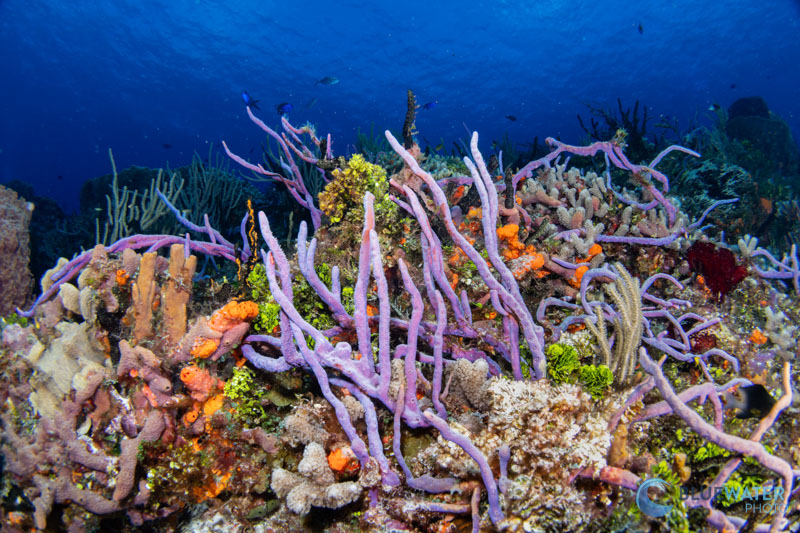
Colorful sponges on the reef in Cozumel, Mexico photographed with dual Scubalamp D-Pro strobes. f/13, 1/160, ISO 200
Recycle Time
Recycle time is a inexact science. Some strobes have a quick recycle time on paper but are not able to take additional shots at a lower power while the strobe is recycling. Other strobes will shoot at a lower power while after the initial high power burst. The Scubalamp D-Pro is a strobe that shoots consistently at an even power. When we shot at 5 frames per second, the strobes had no problem keeping up in most situations. At full power the D-Pros will output at a higher dump for the initial shot before multiple consistent flashes at about a stop lower power for each consecutive shot until the strobe recycles. This consistency made it feel like the recycle time was much quicker than what was listed on paper as most photos in a burst series had good color and consistent lighting. At low power, the D-Pro strobe can keep up with a 10 fps burst speed! For photographers that shoot in low ambient light and don't need as much artificial light from the strobe, the Scubalamp D-Pro can be used at the quickest burst shooting speeds.
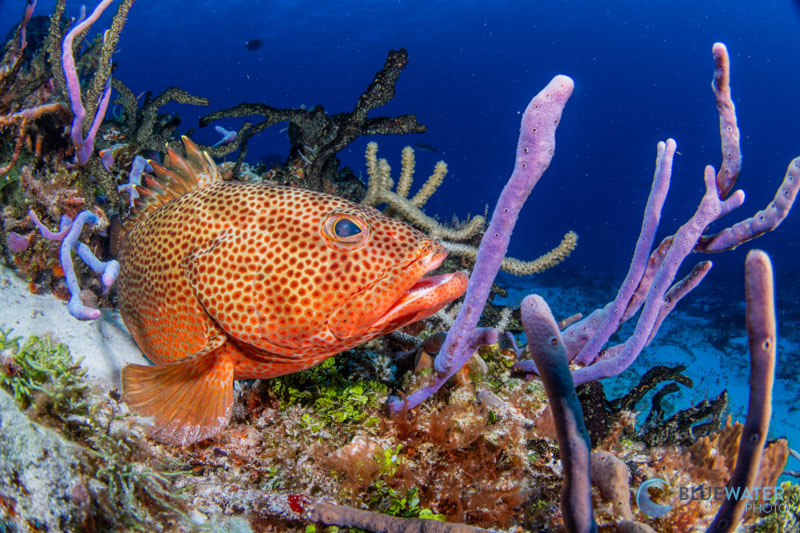
Ultra fast recycle times allow the Scubalamp D-Pro strobes to expose multiple frames to catch quick subjects before they swim away. 1/160, f/13, ISO 200
A Strong Focus Light
The 500 lumen focus light built into the Scubalamp D-Pro is fairly narrow and thus has a stronger lux than the focus lights on most strobes. This makes it particularly effective for shooting in blackwater diving situations as a diver can use the focus light to aim at small subjects floating in the water column. In most cases, however, we dived with the focus light off as strobe positions often call for the strobes not to be directly pointed at the subject. We also used the focus light as a backup dive light as it is a good spotting light.
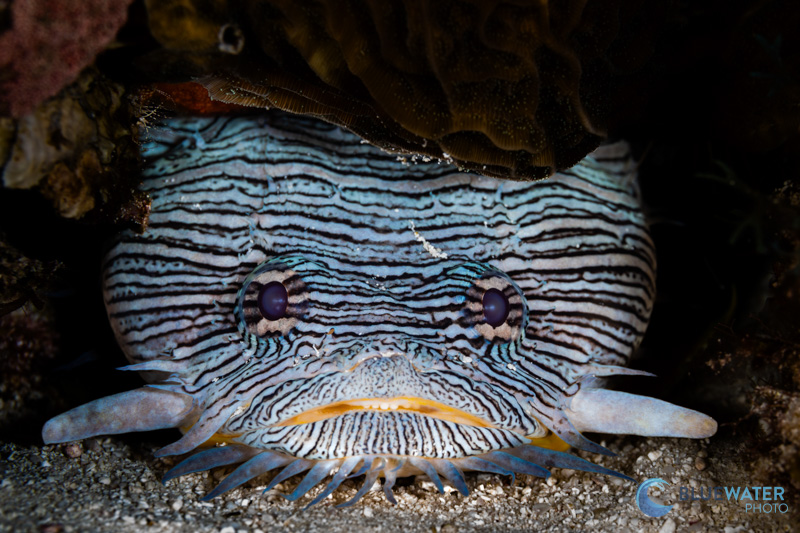
We used the D-Pro's focus light to find this splendid toadfish on a night dive. 1/160, f/11, ISO 200
Battery Life
The D-Pro has a battery life rated for 500 shots at full power. This is about 40% more battery life than AA battery strobes - justifying the larger overall size of the D-Pro. In our experience, the Scubalamp D-Pro strobe can easily last a full day of diving. As most photos are not shot at full power, you can reasonably expect to get 700-1000 shots on a full charge!
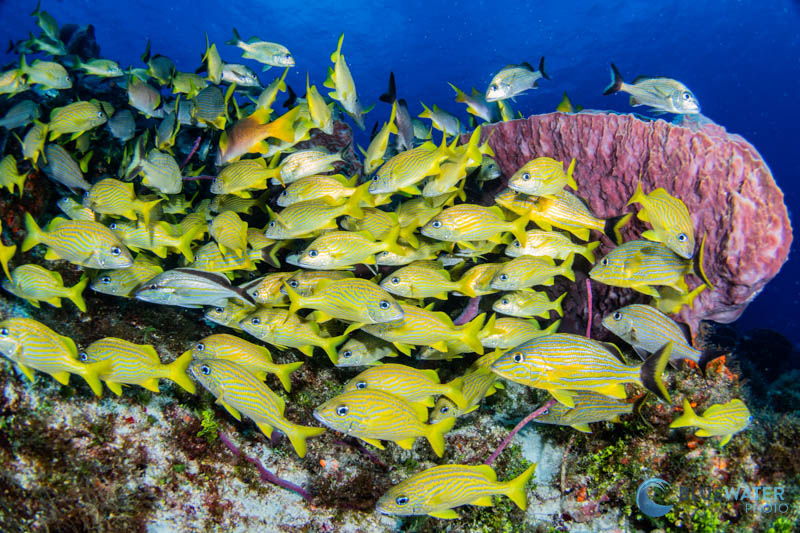
This photo was captured with the Nikon Z8 and Scubalamp D-Pro strobes. f/13, 1/160, ISO 200
Accessories
The Scubalamp D-Pro has a wide range of accessories that unlock a variety of creative effects - from diffusers that soften light to snoots that condense light for black backgrounds. Here are some of the top accessories for the Scubalamp D-Pro strobes.
The D200 Diffuser for Wide Angle Photography
The D200 diffuser is slightly more opaque than the D210 diffuser. It is designed for wide angle photography and helps spread the beam from the D-Pro strobe even wider. The D200 diffuser also reduces the output of the strobe slightly. This results in softer shadows. While adding a diffuser can increase the amount of backscatter in your image, your backscatter will be a bit smaller than without a diffuser.
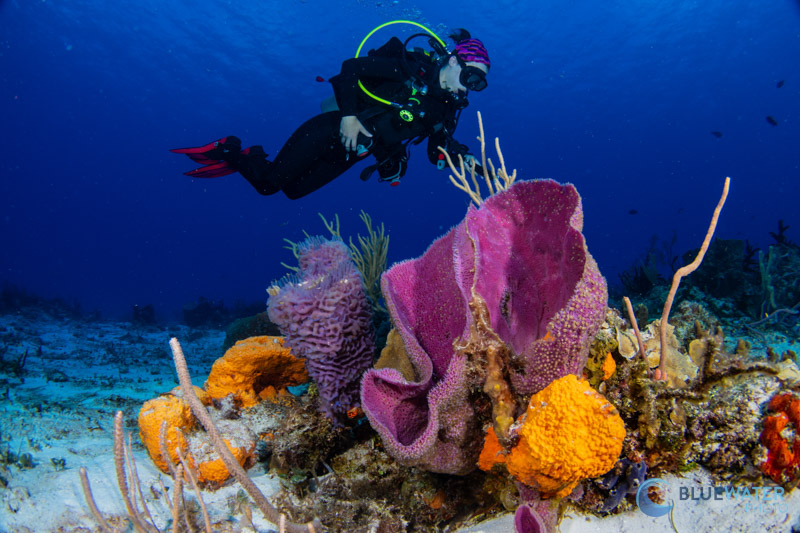
This photo was captured using the D200 diffuser on a Scubalamp strobe. f/13, 1/160, ISO 200
The D210 Diffuser for Macro Photography

The D210 diffuser is designed for underwater macro photography. It is thicker than the D200 diffuser, allowing for softer lighting with less contrast. Macro photography requires less power than wide angle photography, allowing the diffuser to have less light transmission.
The Scubalamp OSD Optical Shaping Device (Snoot)

Snoots allow photographers to condense light into a beam with a significantly smaller width and much higher lux (lumens per square inch). This allows you to focus light only onto your subject and not your background - resulting in a high contrast image, often with a black background. The Scubalamp OSD snoot uses optical lenses to condense light coming from the strobe. The OSD has a built-in aperture that allows you to adjust the width of the beam. It is much easier to use than snoots that require conventional masks.
Who Should Buy the Scubalamp D-Pro Strobes?
The Scubalamp D-Pro is an excellent option for anyone who wants an incredible value in an underwater strobe. At $758 it is priced lower than any other strobe in the "pro" category. However, anyone who wants to use the D-Pro should be willing to travel with a 1kg strobe. Underwater, the weight is much less.
The D-Pro is also a great option for photographers that want simplicity and do not need TTL. The controls are easy to use and operate. However, a lack of TTL (automatic strobe exposure) does make it a little less desirable for quick, fast moving subjects.
The D-Pro's quick recycle times is perfect for photographers using burst shooting to shoot quick moving subjects. Because the recycle time is extremely quick at low power, the strobes perform even better in limited visibility.
Finally, the D-Pro strobe is a wider strobe than others on the market but has a guide number slightly less than other "pro" strobes because of the width of the beam. Ultimately, shooting the D-Pro isn't too different from shooting other strobes with a diffuser.
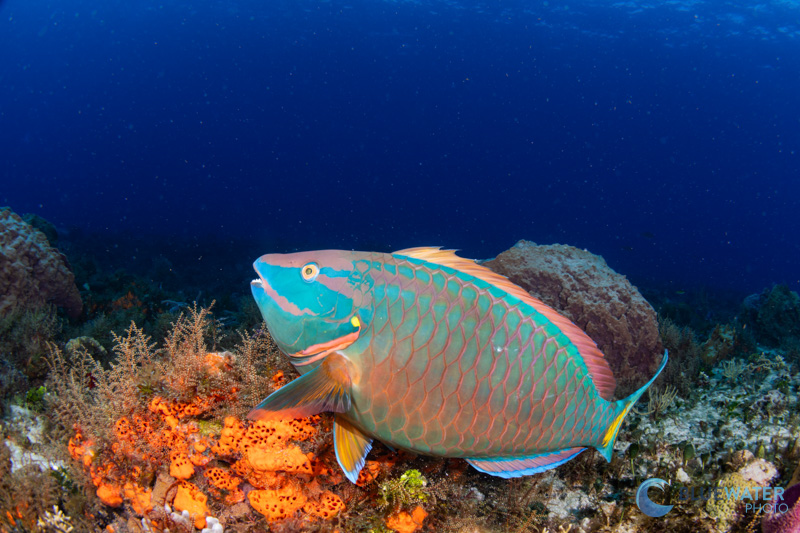
The Scubalamp D-Pro produces beautiful colors with a color temperature of 4800K
Conclusions
The Scubalamp D-Pro should be at the top of every underwater photographer's shopping list. It is an incredible value of 160 Ws of power for a price point of $758. An ultra wide beam angle, long battery life, 4800K color temp, and a large list of accessories check all the boxes off the "must have" list for underwater photography. Perhaps the only consideration someone should take when looking at the D-Pro is it's size. But with that size comes a sturdy aluminum build. All in all, the Scubalamp D-Pro performed incredibly well in Cozumel. We came back with beautiful portraits, landscapes, and macro images - all with sharp details and bright colors. After years of a shrinking strobe market, it's great to see such an innovative well designed product back on the market.
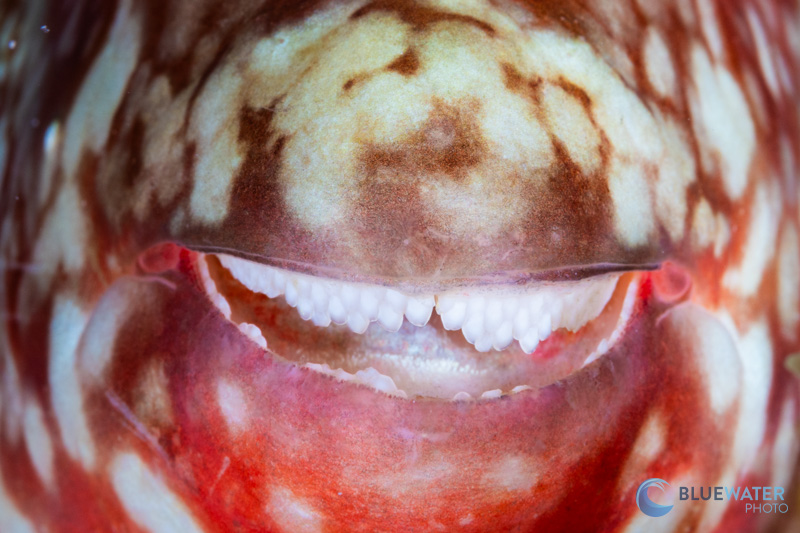
The colors and details on the teeth of this parrotfish were captured with the Scubalamp D-Pro. 1/160, f/25, ISO 200




